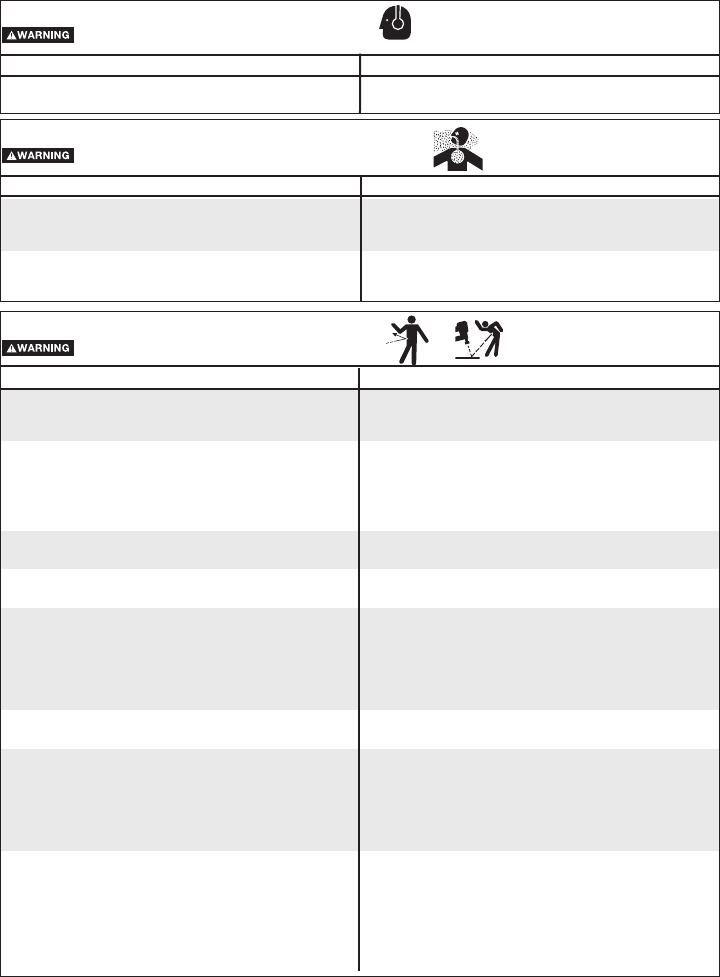
3- ENG
D29847
• A wrench or a key that is left attached to a rotating part
of the tool increases the risk of personal injury.
• Tools left unattended, or with the air hose attached can
be activated by unauthorized persons leading to their
injury or injury to others.
• Air tools can propel fasteners or other materials
throughout the work area.
• Air tools can become activated by accident during
maintenance or tool changes.
• Remove air hose when tool is not in use and store tool
in secure location away from reach of children and or
untrained users.
• Use only parts, fasteners, and accessories
recommended by the manufacturer.
• Keep work area clean and free of clutter. Keep children
and others away from work area during operation of
the tool.
• Keep work area well lit.
• Remove air hose to lubricate or add grinding
attachments, sanding discs, drills, etc. to the tool.
• Never carry the tool by the hose.
• Avoid unintentional starting. Don't carry hooked-up tool
with finger on trigger.
• Repair servicing should be done only by an authorized
service representative.
• Using inflator nozzles for duster applications can cause
serious injury.
• DO NOT use inflator nozzles for duster applications.
• Remove adjusting keys and wrenches before turning
the tool on.
HAZARD
WHAT COULD HAPPEN HOW TO PREVENT IT
RISK OF INJURY
• Always wear MSHA/NIOSH approved, properly fitting
face mask or respirator when using such tools.
• Long term exposure to noise produced from the opera-
tion of air tools can lead to permanent hearing loss.
• Always wear ANSI S3.19 hearing protection.
HAZARD
WHAT COULD HAPPEN HOW TO PREVENT IT
RISK OF LOSS OF HEARING
HAZARD
WHAT COULD HAPPEN HOW TO PREVENT IT
RISK TO BREATHING INHALATION HAZARD
• Always work in a clean, dry, well ventilated area.• Some materials such as adhesives and tar, contain
chemicals whose vapors could cause serious injury
with prolonged exposure.
• Abrasive tools, such as grinders, sanders, and cut-off
tools generate dust and abrasive materials which can
be harmful to human lungs and respiratory system.
• Air tools can cause the workpiece to move upon con-
tact leading to injury.
• Loss of control of the tool can lead to injury to self or
others.
• Use clamps or other devices to prevent movement.
• Never operate tool while under the influence of drugs
or alcohol.
• Don't overreach. Keep proper footing and balance at all
times.
• Keep handles dry, clean, and free from oil and grease.
• Stay alert. Watch what you are doing. Use common
sense. Do not operate tool when you are tired.
• Poor quality, improper, or damaged tools such as
grinding wheels, chisels, sockets, drills, nailers,
staplers, etc., can fly apart during operation, propelling
particles throughout the work area causing serious
injury.
• Always use tool attachments rated for the speed of the
power tool.
• Never use tools which have been dropped, impacted or
damaged by use.
• Use only impact grade sockets on an impact wrench.
• Do not apply excessive force to the tool, let the tool
perform the work.












